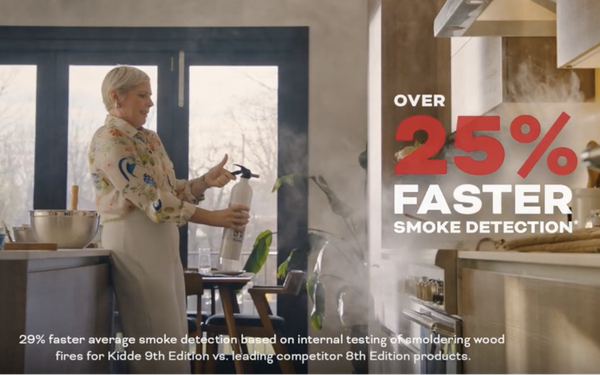
"Help
Protect You From You,” a humorous spot launching today from smoke alarm marketer Kidde, kicks off the brand’s largest-ever
campaign and marks a complete brand relaunch that includes new technology called Kidde Detect, new product design and new packaging.
The spot, which points out that Kidde Detect provides
“over 25% faster smoke detection” than with detectors using older technology, features a busy woman neglecting what she’s put on her stove. The Kidde smoke detector succeeds in
warning the woman of an impending fire, with the “you” in the tagline also referring to the woman’s rather unique ceiling detector -- which takes the form of her own upside-down head
issuing vocal commentary on her actions.
advertisement
advertisement
Chemistry Agency, in its first work for Kidde, has created two :30, one :15 and three :06 versions of the spot, running nationally on linear TV,
connected TV and online video via MIQ programmatic media, YouTube, social media and Google. A radio version is set for iHeart Audio.
As the campaign premieres, Kidde Detect has begun
appearing in stores, according to Kidde president Isis Wu, who tells Marketing Daily that a nationwide rollout starting in the West will be followed by the Midwest, then the Northeast and then
the South. The brand has a category exclusive in Home Depot (competitor First Alert has a similar deal with Lowe’s).
The Detect rollout won’t be complete until next year, Wu says,
but the geographically sequenced process was deemed necessary since the relaunch necessitates that the entire large Kidde line be replaced, and the brand doesn’t want both versions on the shelf
at the same time. Anyone can already buy Detect on Amazon, however.
As part of its makeover,r Kidde is also getting rid of various subbrands, with everything now falling under Kidde
Detect.
Not only is the changeover the largest in Kidde’s history, which spans more than 100 years, but Wu says it’s also the largest “transformation” Home Depot has
ever seen in the electrical category space.”
“If you take a picture of the old shelf and you take a picture of the new shelf, it’s a completely different company, brand and
product line,” she states.
Besides the video and audio spots, the campaign, which Wu says will be an “evergreen,” also includes retail media, social ads, and search engine
marketing.
The fire safety category is usually “out of sight, out of mind” to consumers, she explains. “People think they’ll win the lottery or get struck by lightning
before they’ll have a home fire.”
So, Wu says, “we really need to raise awareness and education… We chose humor because we want it to be more emotionally connective
and relatable.”
When you see the ads, she says, “you’ll look up at your ceiling and wonder if you have a detector that works or needs to be replaced, and you’ll think
about product safety.”
The ads covey that “your inner voice is talking to you about fire safety” and “getting to the message that’s everybody’s human. We
all make mistakes.” She says that 60% of home fires occur because of human error, noting, “It’s not anybody’s fault, but we’re here to protect you.”
Kidde’s broad target audience includes people making home-related purchases, people who are safety-conscious and people who go to home improvement stories, including contractors and other
professionals. Keeping fire safety too-of-mind is particularly important, Wu says, because “20% to 25% of our purchases are impulse-driven.”
The new technology should go far in
driving all-important replacement purchases.
The 25% increase in smoke detection is a “big deal,” Wu explains, since “if you only have two minutes to escape a house
fire, every second counts."
The technology is also three times more precise than older technologies, she says. This greater accuracy “reduces nuisance alarms” which are not
only bothersome but also contribute to unsafe conditions; they annoy people to the point where they “pull their alarms off their walls and ceilings, leaving them unprotected,” Wu
explains.